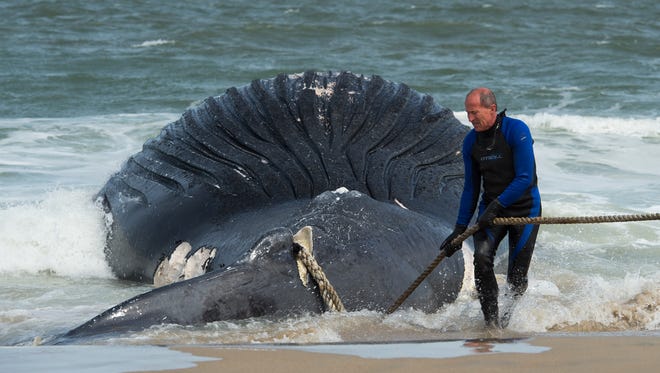Fifth humpback whale washes ashore in Delaware

The humpback whale that washed ashore in Rehoboth Beach on Thursday is the fifth to hit the Delaware coast within the last year, causing concern for officials.
The Marine Education, Research and Rehabilitation Institute had about four hours of daylight to collect samples from the 37-foot-11-inch whale that was seen in the waters just off Deauville Beach, off Henlopen Avenue.
“It is a cause for concern because this will be the fifth humpback whale that has stranded in Delaware in a 10-month period,” said Suzanne Thurman, executive director of MERR, Delaware’s marine mammal stranding team.
“We would normally see that in a 10-year period.”
Thurman said it was not fully an adult as humpback whales can grow between 50 and 55 feet in length. The whale had markings of boat propeller wounds that Thurman suspected were postmortem because they were located on the underside of the carcass.
There were also signs of scavenging from sharks and birds, which is normal, she said.
The whale was significantly decomposed on the inside, Thurman said, but from what they found, it had not been feeding.
More: Fourth dead whale washes ashore
More: Whale death sparks study
A potential scenario, Thurman said, was blunt-force trauma to the lower jaw, meaning it could have possibly been hit by a ship that would have caused damage to the brain. However, Thurman said she wouldn't be able to confirm the nature of the death.
“We might be able to get information from skin and tissue samples, but because of its condition, we couldn’t sample the condition of the organs,” Thurman said.
The incident comes just weeks after a dead, decomposing whale washed into shallow water at Port Mahon near Dover in late April.
The whale in Dover appeared to be a juvenile humpback, Thurman said in a recent article.
Thurman said a recent dead whale found at the Port of Wilmington was entangled in fishing gear. In June 2016, a juvenile humpback whale washed ashore in Bethany Beach with a large gash near its neck.

None of the Delaware whales survived, but Thurman said they were all about the same length: 30 feet.
The National Oceanic and Atmospheric Administration Marine Fisheries has declared an unusual mortality event for the large marine mammals, but the agency isn't sharing information about that decision just yet.
An unusual mortality event is declared when higher-than-normal numbers of marine mammals die for unknown reasons. When marine mammals die unexpectedly, it can be a signal of a problem with ocean health. The last unusual mortality event in the area was the 2013-2015 bottlenose dolphin die-off in the mid-Atlantic.
But the incident has not just been noted in Delaware.
In February, four whales washed ashore in Virginia.
Alexander Costidis, stranding coordinator for the Virginia Aquarium's Stranding Response Team, investigated the deaths in Virginia.
"Unfortunately, preliminary data suggest that at least some of the local whales are spending considerable time in the bay's shipping channels, which see considerable vessel traffic," said Costidis at the time.
For Thursday’s whale incident, Thurman and MERR scientists were in a race against daylight and equipment. Thanks to the Delaware Department of Transportation and Department of Natural Resources and Environmental Control, Thurman said, researchers were able to collect information for about four hours after the whale’s mid-day discovery.

After collecting as much information as possible, the whale was buried near Gordy’s Pond inside Cape Henlopen State Park.
Now, MERR will submit its findings and data to NOAA and hope to identify the whale because humpbacks are tracked. The whale beaching is the 43rd on the East Coast in the last year, Thurman said.
And there’s the possibility for more.
Thurman said MERR was notified of two additional whales floating in Delaware Bay this week. One was reported near the New Jersey side of the bay Wednesday, and another that was closer to Delaware.
Because MERR was not able to collect any photographs of those whales, the group is unsure if the whale that came ashore Thursday in Rehoboth Beach was one of the two spotted or if another would be following suit.
“There is a possibility,” Thurman said. “But that would be tough to confirm.”
News Journal reporter Molly Murray contributed to this article.
rmarshall@delmarvanow.com